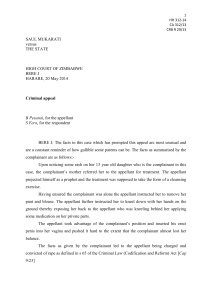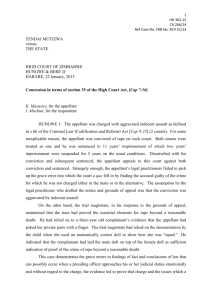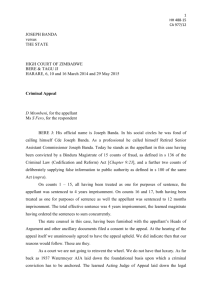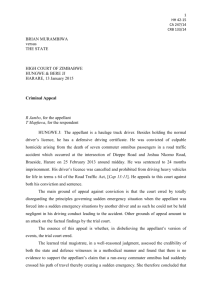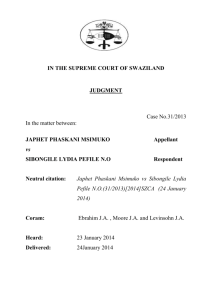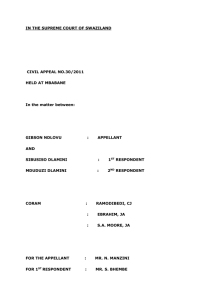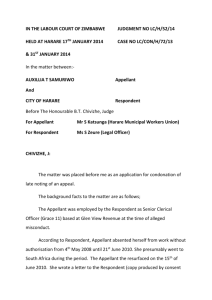ENERST KABWITA AND THE PEOPLE - JUDGMENT 8
advertisement
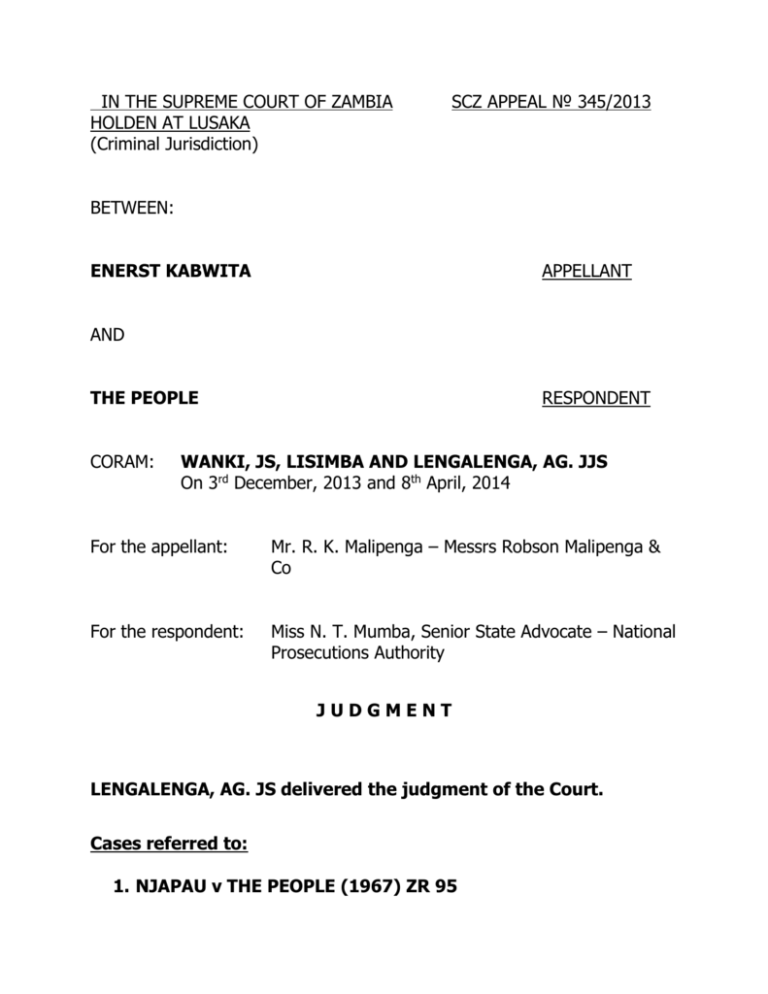
IN THE SUPREME COURT OF ZAMBIA HOLDEN AT LUSAKA (Criminal Jurisdiction) SCZ APPEAL № 345/2013 BETWEEN: ENERST KABWITA APPELLANT AND THE PEOPLE CORAM: RESPONDENT WANKI, JS, LISIMBA AND LENGALENGA, AG. JJS On 3rd December, 2013 and 8th April, 2014 For the appellant: Mr. R. K. Malipenga – Messrs Robson Malipenga & Co For the respondent: Miss N. T. Mumba, Senior State Advocate – National Prosecutions Authority JUDGMENT LENGALENGA, AG. JS delivered the judgment of the Court. Cases referred to: 1. NJAPAU v THE PEOPLE (1967) ZR 95 J2 2. KATEBE v THE PEOPLE (1975) ZR 13 3. EMMANUEL PHIRI & OTHERS v THE PEOPLE (1978) ZR 79 4. KAMBARAGE MPUNDU KAUNDA v THE PEOPLE (1990) ZR 215 Legislation referred to: 1. The Penal Code, Cap. 87 of the Laws of Zambia. 2. The Criminal Procedure Code, Cap. 88 of the Laws of Zambia. The appellant was convicted of indecent assault on females contrary to section 137 of the Penal Code, Chapter 87 as read together with Act № 15 of 2005 of the Laws of Zambia. The particulars of offence are that Enerst Kabwita between 1st January and 2nd February, 2010 at Lusaka in the Lusaka District of the Lusaka Province of the Republic of Zambia, did unlawfully and indecently assault a female. He was tried, convicted and sentenced to fifteen (15) years simple imprisonment effective from date of arrest, 23rd February, 2012. He now appeals against the conviction. The prosecution case rested on the evidence of six witnesses, PW1, PW2, PW3, PW4, PW5 and PW6. Briefly, the prosecution evidence was to the effect that PW1, Janet Chisenga’s thirteen year old daughter was allegedly repeatedly indecently assaulted by the appellant between 1st January and 2nd February, 2010. When PW1 moved to Kamwala South her four children remained with her sister, PW2, Emma Chilufya in Garden Compound in J3 Lusaka. On 30th January, 2010 the children visited her in Kamwala South and on 2nd February, 2010, they left PW1’s house without telling her and went back to Garden Compound. On the same day in the evening around 19:00 hours PW1 received a phone call from her sister informing her why the children refused to move with her to Kamwala South. After being told by PW2 that her second born daughter had been defiled, the following morning PW1 went to Garden Police Post where she found the appellant. She found that the child had also been taken to the police. The prosecutrix narrated how the appellant used to usher her into his house and send her young sister away. Then he would tell her to undress and made her to lie on the chair while he undressed in the bedroom. She said that he would then return and smear some oil on his manhood and put it on her private part but he would not insert it inside. Whenever he finished he would give her K50 000.00 or K100 000.00. PW1 used to be a neighbour to the appellant when she lived in Garden Compound and the appellant lived in Luangwa Garden Compound in the same area as PW1’s sister. PW1 had known appellant since 2009 because the children from church used to sing choir songs at appellant’s house. She J4 said that the child was taken for medical examination to University Teaching Hospital (UTH). PW2, Emma Chilufya confirmed in her evidence that she checked the child and saw dry semen on her thighs. She was the one who took her for medical examination to UTH. She was told that the child was abused but there was no penetration. The appellant was apprehended when PW2’s young brother went to his house after the children led him there. PW2 admitted beating the youngest child and then the prosecutrix revealed that the appellant used to put his manhood on her. She confirmed that the child took a bath at PW2’s home in Garden Compound and also washed her pant. She, however, stated that the pant also had little semen than the thighs. According to the child, the appellant sexually assaulted her on numerous occasions by placing his penis on her vagina. PW3, the prosecutrix testified on oath after a voire dire was conducted. She narrated how she was first called by the appellant when she was playing with her friends. He called her to his house to do some works but instead once they were inside the house, he undressed himself and undressed her and then slept on top of her. PW3 said that he slept with her six times and that he would give her money every time, K50 000.00. She also said that J5 she did not report what was happening because the appellant threatened to turn her into a monkey if she revealed what was happening. PW4, an eleven year old and PW1’s daughter and sister to the prosecutrix testified that the prosecutrix used to go home with money whenever she came from the appellant. She said that they used to go to Manda Hill to buy dolls and doughnuts from the money. PW4 also confirmed that she used to remain outside. PW5, Ian Nyendwa Mofya Kambale testified that on 29th January, 2010 Anna told him that his nieces used to bring home rice, mealie meal, yoghurt, dolls and sometimes K50 000.00. When he threatened them with a beating, they revealed that they got the items from the appellant. PW6, Sergeant Eddie Chile of Emmasdale Police Station received a report from Anna Chilufya that her niece had been sexually assaulted. He took up the case, issued a medical examination report to the prosecutrix. He subsequently charged and arrested the appellant for indecent assault on a female on the strength of the contents of the medical report. He said that the medical report from the hospital stated: “possible sexual abuse on the child.” PW6 explained that he was not the one who granted bond to J6 the accused when he was queried about the charge of defilement indicated on the bond document. In his defence, the appellant testified on oath to the effect that on 29th January, 2010 around 19:00 hours he was in his house. Then a car parked in front of his house and he went to see who it was. Two men got out of the car and went to where he was and one of them asked him whether he was Mr. Kabwita. He refused to answer until they introduced themselves. He asked him why he wanted Mr. Kabwita and he said that they were from the police and they had gone there to pick Mr. Kabwita. He later told them that he was Mr. Kabwita and then the man who was rude to him told him that he had received a report that he had defiled his daughter. Thereafter, he accompanied the police officer after locking his house. When he was ushered into the car, he noticed two girls seated at the back of the car. They drove to Garden Police Post where he learnt that the police had received a report that he had defiled a girl. The appellant stated that in his presence PW5 told the police that on 29th January, 2010 he had received a report from his sisters, PW1 and PW2 that he had defiled their daughter PW3. He said that he was accused of having given her rice, mealie meal and some money. He said that PW5 beat up PW3 and PW4 and forced them to implicate him J7 in defilement. The appellant said that he denied the charge or allegation that he defiled the girl. He was later released on police bond pending investigations. On 11th February, 2010 when he went to report to police he was referred to the CIO (Criminal Investigations Officer). He found him with PW1, PW2, PW4 and PW5 and the CIO told them that the police had established that the defilement was a false case. The appellant stated that the police dropped the charge against him but his accusers were a bit desperate, they asked him in the presence of the CIO that they wanted to settle the case outside through negotiations. He rejected the offer. The appellant testified that the defilement charge was later substituted with one for indecent assault of PW3. He claimed that he argued with the CIO that that was an act of intimidation. He stated that the evidence of the two children was not true because children in the compound play everywhere around and that it was not his task to see where children play. He denied giving money to the two children. He disputed PW5’s allegation that he attempted to run away and he claimed that he was at his house. He also denied that he knew PW1 and PW2 prior to his apprehension. He said that he did not know PW5. The appellant stated that he had been married before but his wife died in 2001 J8 after he had just retired. He said that since then he stayed with two nephews, namely Joseph and Mike even though he had told the court that earlier. He insisted that the girls stated at the police station that they were beaten so that they could point at him as the one who defiled them. The appellant was cross-examined at great length. The appellant was later convicted. In the appellant’s head of arguments, Counsel for the appellant, Mr. R. K. Malipenga addressed a number of issues. The first is the credibility of witnesses and witness with interest to serve. He submitted that out of the six prosecution witnesses, five of them, namely PW1, PW2, PW3, PW4 and PW5 were witnesses with an interest to serve. He submitted further that when the defilement charge failed and was dropped, the appellant’s accusers became desperate and asked him in the presence of the Chief Investigations Officer (CIO) to settle the case outside court (see record of proceedings page 51 and lines 27 to 30). He further submitted that the appellant’s evidence was not challenged. Learned Counsel for the appellant argued that the trial court had a duty to call the Chief Investigations Officer as a witness who the accused did not call in the interest of justice. J9 Mr. Malipenga submitted that the trial court and the High Court Judge both stated that the prosecution evidence was corroborated. He argued that PW1 to PW5 were family members with an interest to serve and as such could not corroborate each other’s evidence. He contended, therefore, that there was no independent evidence to corroborate the prosecution evidence. He submitted that the police should have interviewed the prosecutrix, PW3’s friends who she named at pages 27, 28 and 29 of the record. Learned Counsel for the appellant argued that although PW2 alleged to have seen semen on PW3’s thigh and on her pant, PW1 did not mention it. He argued further that not even the police saw the semen because there was no female officer. He submitted that both the trial court and the review court accepted that there was semen on PW3. He contended that the story of semen was concocted and that this Court should reject this evidence. Mr. Malipenga contended that there were contradictions in the evidence of the prosecution witnesses, especially PW3 and PW4. He referred us to page 30, lines 10 to 13 and page 35, lines 13, 14, 17 and 18 of the record. He submitted that the learned trial magistrate could not make an expert medical opinion on “P1,” the medical report. He referred us to the learned trial magistrate’s comments at page 75 lines 18 to 21: J10 “Further P1 states that defilement could not be ruled out despite the findings. Where defilement cannot be ruled out, it entails an element of indecency on the victim in this case amounting to indecent assault. This is because private parts of the victim are tampered with in an immoral sense.” Learned Counsel for the appellant argued that the learned trial magistrate and the High Court Judge did not address itself to the ingredients of indecent assault when they considered “P1” in the absence of attending medical doctor expert opinion. He argued that “P1” is unreliable because it was not authenticated by anyone from UTH. Mr. Malipenga further contended that the evidence from PW3 and PW4 was procured through threats, beating and duress by PW1 with a view to frame up the appellant. He submitted that the trial court neglected to consider what effect the threats and beatings had on the children. He argued that the weight to be attached to evidence of children of tender age who are beaten in order to testify should be less. Learned Counsel for the appellant submitted further that PW2 and PW3 had a negative image of the appellant who they labelled a witch. In conclusion, he submitted that this appeal has merit and he invited this Court to examine the inconsistencies, lies, lack of corroboration to J11 support indecent assault. He urged the Court to allow the appeal and acquit the appellant. He further submitted that the medical report “P1” has no evidential value in relation to the charge the appellant was convicted of. Learned Counsel for the appellant relied on the case of NJAPAU v THE PEOPLE1 to support his argument that the learned trial magistrate did not state and establish the ingredients of indecent assault. He submitted that the same were not present in this case. Counsel for the respondent, Miss N. T. Mumba, Senior State Advocate submitted that she fully supports the appellant’s conviction by the trial Court as there is overwhelming evidence justifying the conviction. She stated that it is evident from PW3’s testimony that the appellant used to call her to his place where he would sleep on top of her doing whatever he was doing. She argued that those circumstances prove the offence of indecent assault which was confirmed by medical report “P1” which stated that although the hymen was present, defilement could not be ruled out. Miss Mumba submitted further that the appellant’s act of undressing the prosecutrix and undressing himself amounted to indecency. She submitted, therefore, that the learned trial Court was on firm ground when J12 it found that the appellant’s conduct amounted to indecent assault. She urged us to confirm the findings of the trial Court. With regard to corroboration, learned Senior State Advocate submitted that PW3’s evidence was corroborated by PW2 and PW4’s evidence. She submitted further that the corroborative evidence was properly found by the trial Court to consist of all the things the prosecutrix used to take home every time she was called by appellant to his house. She further submitted that the absence of independent witnesses to testify as to the indecent assault, is not fatal on its own. To support this argument Miss Mumba relied on the case of KATEBE v THE PEOPLE2 where this Court held that in sexual offences an accused may be convicted on uncorroborated evidence of the prosecutrix if there are special and compelling reasons to do so. She contended that in this case there are special and compelling reasons to do so, namely the absence of any motive to falsely implicate the appellant from all the men in the area where both the prosecutrix and the appellant lived. Learned Senior State Advocate submitted that further corroborative evidence was from PW5 to the effect that the appellant tried to run away at the time of apprehension. She rejected the appellant’s allegation that he J13 was asked by PW3’s relatives in the Chief Investigations Officer’s presence to settle the matter. With respect to the appellant’s plea that “P1” the medical report should be disregarded on the ground of not being authentic, Miss Mumba argued that it was not only duly signed by Dr. J. K. Mwansa but it bears the University Teaching Hospital official date stamp (30th January, 2010). She submitted that it was also admitted in evidence in accordance with section 191A of the Criminal Procedure Code, Cap. 88 of the Laws of Zambia. Learned Counsel for the respondent submitted further that “P1” was admitted in evidence without objection from the appellant. In response to the appellant’s contention that PW3 and PW4 testified against him because they were threatened and beaten, Miss Mumba argued that according to the record, PW3 was beaten so that she could reveal the source of the things she used to take home and for leaving PW1’s home without permission. She further submitted that there was nothing on record to indicate that PW2 perceived the appellant as a wizard. Hence she could not have framed him on that account. Learned Counsel for the respondent submitted that the appellant was properly convicted by the trial Court on the overwhelming evidence on J14 record. She further relied on EMMANUEL PHIRI AND OTHERS v THE PEOPLE3 to support her argument that there was sufficient corroboration. In conclusion, she submitted that the learned trial Court was on firm ground when it convicted the appellant. She, therefore, prayed that this Court uphold the appellant’s conviction and dismiss his appeal. We have carefully considered the evidence adduced at trial and the submissions made on behalf of the appellant and the respondent. We are grateful to Counsel for the submissions. It is not disputed that out of the six prosecution witnesses, five were family members. PW3 was the prosecutrix who was thirteen (13) years old at the time of the alleged commission of the offence. PW4 was the eleven (11) year old child witness who corroborated PW3’s evidence of how they used to go to Manda Hill to buy all sorts of items from the money that PW3 used to receive from the appellant. She had also testified that she used to go near the appellant’s house and wait outside whilst PW3 went inside. PW4 confirmed that sometimes PW3 used to come out of the appellant’s house with mealie meal and rice. Further, we noted that in cross-examination by Defence Counsel, PW4 explained that she was beaten by her auntie for going to the appellant’s house and not so that she could implicate the appellant. J15 Counsel for the appellant challenged the credibility of PW1 to PW5’s evidence since they were family members. He contended that they were witnesses with an interest to serve especially when the complaint of defilement failed. We accept that PW1, PW2, PW4 and PW5 being relatives of the prosecutrix, PW3 were suspect witnesses in terms of the definition in the case of KAMBARAGE MPUNDU KAUNDA v THE PEOPLE4 where this Court held inter alia: “Prosecution witnesses who are friends or relatives of the prosecutrix may have a possible interest of their own to serve and should be treated as suspect witnesses. The Court should, therefore, warn itself against the danger of false implication of the accused and go further to ensure that that danger has been excluded.” In the present case, the learned trial magistrate observed that the parents testified on what they observed. She observed that PW3 and PW4’s evidence of identity of the appellant was corroborated by the appellant himself who accepted in his defence that children played from his home. PW3 testified on oath of how the appellant on several occasions used to either undress her or tell her to undress while he undressed in the bedroom and then he would sleep on top of her but would not penetrate her vagina with his manhood. This was consistent with the charge of indecent assault on a female. In terms of corroboration of PW3’s evidence, we accept J16 that it was corroborated by PW2 and PW4’s evidence and the items that PW3 used to take home every time she came from the appellant’s house. We further accept the learned Senior State Advocate’s argument that in sexual offences, an accused may be convicted on uncorroborated evidence if there are special and compelling reasons to do so, based on this Court’s decision in KATEBE v THE PEOPLE. We accordingly, accept Miss Mumba’s submission that there was no motive for PW3 and PW4 to falsely implicate the appellant out of all the men in the area where the prosecutrix and appellant lived. Further, when PW5, Ian Nyendwa Mofya Kambale, the prosecutrix’ uncle went to confront the appellant and to inform him that he wanted to take him to the police, he ran away but was apprehended by PW5. We find that this act by the appellant was a special and compelling reason and also amounted to something more to corroborate PW3’s evidence. Why else would the appellant run away after confirming that he knew PW3 and PW4 other than guilt? From learned Counsel for the appellant’s arguments, we observed that he took up issue with the medical examination report “P1” and argued that it was not authentic as no-one from the University Teaching Hospital had J17 authenticated it. We reject Mr. Malipenga’s argument and accept Miss Mumba’s submission that “P1” was duly signed by Dr. J. K. Mwansa and date stamped 30 Jan 10 with the University Teaching Hospital official stamp. She further submitted that “P1” was admitted in evidence without objection from the appellant. We, therefore, find that “P1” is not only authentic but that it was duly admitted in evidence without objection from the appellant. Our perusal of “P1” indicated that the hymen was intact but the doctor stated that “defilement could not be ruled.” We are of the considered view that the evidence of presence of the hymen is consistent with PW3’s evidence of indecent assault. Learned Counsel for the appellant argued that PW3 and PW4’s evidence was procured through threats and beatings by PW1 with a view to frame up the appellant. Miss Mumba countered that argument by submitting that there is evidence on record to indicate that PW3 was beaten so that she could reveal the source of the items she used to take home and for leaving PW1’s house without permission. We also observed from PW4’s testimony that she stated in cross-examination by Defence Counsel at page 36 and line 21 of the record that her auntie beat her because they were going to Kabwita’s house. Therefore, we do not accept that PW3 and PW4 were J18 threatened and beaten in order to implicate the appellant. Further, they were threatened and beaten in order to reveal the source of the items they used to take home, for leaving PW1’s house without permission and going to the appellant’s house. Finally, we turn to the appellant’s allegation that after the police dropped the charge of defilement, the prosecutrix’ family out of desperation tried to settle the case outside court through negotiations. Our perusal of the court record at page 45 and lines 6 to 7 shows that PW6, Sergeant Eddie Chile, № 30046 denied that the relatives to prosecutrix wanted to settle the matter with the accused ex-curia. In fact, from the evidence in cross- examination, PW6 explained why he charged the appellant with the subject offence as opposed to the defilement that was not ruled out by the doctor. Therefore, we do not accept the appellant’s evidence in his defence that it was the prosecutrix’ family that demanded a substitution of the charge. We, are further of the considered view that if the appellant was initially truly charged with defilement and the charge was dropped, then there was nothing to settle outside court as alleged. In conclusion, this Court dismisses the appellant’s arguments on lack of credibility of the prosecution witnesses and corroboration, procurement J19 of PW3 and PW4’s evidence through threats, and beatings. We find that the learned trial magistrate was on firm ground in convicting the appellant. We find that the whole appeal lacks merit. The appellant who was aged 64 years and was a neighbor to PW2, the auntie to the prosecutrix, on several occasions between 1st January and 2nd February, 2010 shamelessly enticed the thirteen (13) year old prosecutrix with money and gifts in the form of food. Thereafter, he indecently assaulted her on several occasions and even went to the extent of threatening to turn her into a monkey if she told anyone. She believed the threat and she was afraid since she said that people used to say that the appellant was a wizard. Therefore, for the reasons stated, the appeal is dismissed for lacking merit. We, accordingly, uphold the conviction. However, with respect to the sentence, we find that it was wrong in principle in that the learned sentencing Judge imposed a sentence of fifteen (15) years simple imprisonment instead of hard labour. We, accordingly, set aside the earlier sentence of fifteen (15) years simple imprisonment and substitute it with one of fifteen (15) years imprisonment with hard labour effective from date of arrest. J20 …………………………………………………. M. E. Wanki SUPREME COURT JUDGE ……………………………………………………….. M. Lisimba ACTING SUPREME COURT JUDGE ………………………………………………………… F. M. Lengalenga ACTING SUPREME COURT JUDGE


